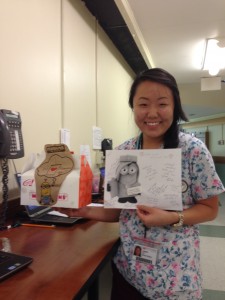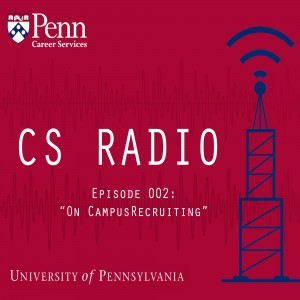This is the next in a series of posts by recipients of the Career Services Summer Funding grant. We’ve asked funding recipients to reflect on their summer experiences and talk about the industries in which they’ve been spending the summer. You can read the entire series here.
This entry is by Sarah Ku, Nursing ’16
 This summer, I spent 8 weeks externing at Fox Chase Cancer Center in Northeast Philadelphia. I learned an incredible amount about cancer both at the bedsides of patients and also through the observational opportunities I was given. One of my most unforgettable days was when I observed in the Operating Room. I witnessed the excision of borders around a facial lesion which were then sent to pathology to be tested for cancerous cells. Fortunately, none of the borders were cancerous and by the time I came back from the surgical pathology room, the surgeon had already removed the lesion and was sewing the patient’s skin back together. This process was insightful as to how some cancers are diagnosed and can be immediately treated.
This summer, I spent 8 weeks externing at Fox Chase Cancer Center in Northeast Philadelphia. I learned an incredible amount about cancer both at the bedsides of patients and also through the observational opportunities I was given. One of my most unforgettable days was when I observed in the Operating Room. I witnessed the excision of borders around a facial lesion which were then sent to pathology to be tested for cancerous cells. Fortunately, none of the borders were cancerous and by the time I came back from the surgical pathology room, the surgeon had already removed the lesion and was sewing the patient’s skin back together. This process was insightful as to how some cancers are diagnosed and can be immediately treated.
The information I learned regarding more terminal cancers were made on the floor of a medical oncology unit. During my first couple weeks, I witnessed a patient code, or have cardiopulmonary arrest. Throughout my clinicals, none of my patients ever coded so seeing the efficiency of procedures that occurred after the code was called was something I never would have expected to see. Unfortunately, this particular patient could not be resuscitated and I learned some first-hand post-mortem care as well.
Of course, not every one of my days at my externship were as eventful or insightful as the two I mentioned. Most days I learned about the true nature of nursing which included timing patient care, phrasing information in the most accurate but least painful way, making patients comfortable, and cleaning up patients who soiled their beds because they could not make it to their restrooms. Some days were more difficult than others and sometimes, my patience ran thin even though I had the amazing opportunity to help people with terminal illnesses feel better physically and emotionally. It was difficult to wake up at 4:45 AM, take a train and a bus, make it on to the floor by 6:30 AM, work a 12 hour shift and make the same commute back home. Still, by the end of my internship, I can honestly say that I still love nursing and the population of cancer patients.
I believe that the greatest lesson I learned this summer was not really about cancer at all. I think it was learning to be human, to find humanity in every situation I am in, and to embrace that humanity once it is found. This lesson came from the countless connections that I made with patients. It came from realizing that even though I was a nurse extern, I was still human and could relate to a patient’s husband because we both shared the struggle of overcoming language and cultural barriers. It came from finding the humanity in death and embracing that humanity because every life was so full and beautiful. Deaths became more about the lives they lived than their endings. How lucky I am that my future career is not only to take care of people, but to meet people, to listen to their stories, and share our lives with each other.


